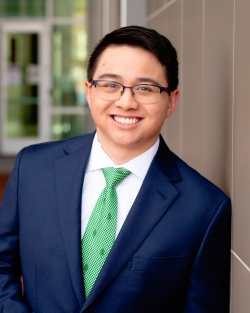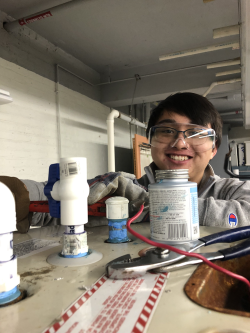
- About
- Education
- Research
- Engagement & Collaboration
- News & Events
Back to Top Nav
Back to Top Nav
Back to Top Nav
Back to Top Nav
Hometown: Los Alamos, NM
Major: Biomedical Engineering Sciences (BA/BE)

While the Upper Valley may seem vastly different from the high desert of Los Alamos, New Mexico, where Ethan Aulwes '21 TH'22 grew up, the skiing, hiking, and camping opportunities that abound around Dartmouth's campus felt appealingly similar to home. Dartmouth's approach to engineering resonated with Ethan, as well.
"I was pretty sure I wanted to study biomedical engineering," he explains, "but I thought that Dartmouth's approach to engineering was a good route for me because it gave me a lot of flexibility to take different classes and have a liberal arts education. I knew I'd have more academic exploration than if I went to a big state engineering school."
For Ethan, some of that exploration came with the opportunity to participate in a Dartmouth Humanitarian Engineering project focused on displacing firewood usage in a Ugandan school kitchen.
While there is certainly a health angle to the project — widespread deforestation and smoke exposure both have serious negative health implications — the project wasn't specifically in Ethan's biomedical engineering wheelhouse. But when his classmate and friend Noah Daniel '22 asked for Ethan's help with a specific problem related to the project, Ethan was hooked! "Looking back I couldn't have predicted that I would have been interested in this when I was applying to Dartmouth. But the solar heater was a really interesting problem to solve."
And while the energy and other technical aspects of the project weren't specific to biomedical engineering, to Ethan's mind, "any project you work on in engineering has a similar problem-solving approach. I was still doing engineering."

Additionally, he says, he sees biomedical engineering projects inevitably connecting to energy and climate. "When products are designed for human health, you have to have sustainability in your thought process. For example, I did an ENGS 89/90 [a senior capstone course for engineering students] project making a medical device that could get deployed in low-resource communities. We still had to think about sustainability in how it was made and the societal impact it would have."
The solar heater team will have a chance to see the potential impact of its work this summer when they travel to Uganda to install their prototype at Uganda Christian University. And when he returns to the Hanover area in the fall, in addition to applying for medical school, Ethan hopes to continue with the DHE, helping advise a new project team who will be looking to build on the solar heater work for larger-scale implementation.
Ethan encourages new Dartmouth students to get involved in projects like these as soon as possible. "The earlier students can involve themselves in design-based projects, the more they're going to get out of their experience at college. You might not have the opportunity to work on a project in class until your second year or beyond, but there are plenty of resources and staff ready to talk about solving a cool problem — it's just that the students have to bring it to them first."
And you don't have to come to the project with expertise, he says. In fact, he says, non-expert perspectives on problem-solving teams are essential. "There's a huge benefit to getting someone to look at a problem who isn't well-versed in the industry," he says, "and, more often than not, they'll ask a question that the experts wouldn't even have thought to ask! Neither Noah nor I were energy engineers. We never worked in the PV industry or the plumbing industry … all you need is curiosity and the initiative to go talk to people who can help you figure it out."